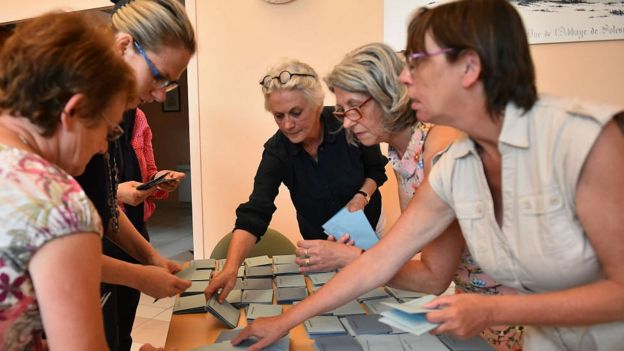Projections show La Republique en Marche (Republic on the Move) and its MoDem ally set to win up to 445 seats in the 577-seat National Assembly.
The final outcome will be decided at a run-off next Sunday.
Mr Macron's party was established just over a year ago and many candidates have little or no political experience.
With all the ballots counted, Mr Macron's LREM and MoDem had won 32.3% of the vote.
The centre-right Republicans had just under 16%, while the Socialists, previously France's ruling party, had won just 7.4%.
The far-right National Front (FN) had 13.2%, followed by the far-left France Unbowed on just over 11%.
But turnout was sharply down, at 48.7% compared with 57.2% in the first round in 2012, which analysts say reflected a sense of resignation among Mr Macron's opponents.
- Can Macron's new party win majority he needs?
- Is Macron the anti-Trump?
- What are Macron's new policies?
French political map redrawn - Hugh Schofield, BBC News, Paris
There can be no disputing the extraordinary achievement of Emmanuel Macron. Yes, he has certainly had luck but he has also foreseen with uncanny clarity how - with the right moves at the right places at the right times - the map of French politics was waiting to be redrawn.
If the projections from the first round are sustained, then the change that is about to happen to the National Assembly is as big as the one that occurred in 1958 when Charles de Gaulle brought in the Fifth Republic.
Scores, hundreds, of new MPs will be arriving who have never set foot in a debating chamber of any kind, let alone the country's legislature.
It is all liable to bring a rush of blood to the head, and the greatest danger right now for Macron and En Marche is hubris. The victory is no doubt spectacular but so far it has all been electoral.
Phase two of the Macron master plan - actual reform - is the next challenge. And bigger.
German Chancellor Angela Merkel congratulated Mr Macron on the "great success" of his party. It was a "vote for reforms", tweeted (in German) her spokesman, Steffen Seibert.
Mr Macron, 39, defeated FN leader Marine Le Pen in the presidential run-off last month.
He needs a majority to push through the changes that he promised in his campaign.
He has already left an impression around the world, in particular for standing up to US leader Donald Trump on issues like climate change.
After the projections were announced, a government spokesman said voters had shown they wanted to move fast on major reforms.
But François Baroin, head of the Republicans, said the low turnout testified to the "deep divisions in French society" and was "extremely worrying".
Marine Le Pen blamed her party's poor performance on the low turnout, saying France's electoral system, which favours larger parties, needed to be reformed.
"This catastrophic abstention rate should raise the question of the voting rules which keep millions of our compatriots away from the polling stations," she said.
Socialist leader Jean-Christophe Cambadélis lost his seat in the first round.
He warned voters against giving LREM an absolute majority next Sunday, saying it would result in "virtually no real opposition and we will have a National Assembly without any real counterbalance, without a democratic debate and not worthy of that name".
Those standing for LREM come from all walks of life and include students, retired citizens and a bullfighter.
To win in the first round, candidates had to gain at least 50% of the vote.
The election took place amid heightened security after a series of devastating terror attacks in recent years.

[BBC Sources]


0 comments:
Post a Comment